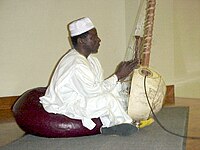Sodality (Bahianology)
The term Sodality, when used in the context of academic discussion of Bahian societies and histories, refers to a tradition of initiatory societies, typically religious or otherwise spiritual, which have existed within Bahia across ethnic groups. Other terms which have been used have included Confraternity, which is now used to designate more specifically the secretive student clubs which have arisen in universities since Mabifia's independence, and secret society or hunter's lodge, which are still often used in popular history but have been abandoned due to the emotional meaning carried with the term. The term is used to designate any non-kinship based group which employs initiatory and secretive practices, has restricted membership, and a shared goal or mythos. Though often conflated with Bahian fetishism, sodalities are present in both Irfanic and Sotirian Bahia, and have been influential in the diaspora.
The institution of sodalities is believed to date back to artisan guilds during the Hourege period. As society was strictly divided into castes based on occupation, many of these professions such as hunters and blacksmiths formed initiatory groups to preserve their skills and share in rituals. However, the rise of sodalities to their peak of importance is typically held to have occured due to the pressures of the Transvehemens Slave Trade, which both threatened the Houregic system with the adoption of a more fiscalised state and presented dangers to both people's freedom and belief systems. Sodalities emerged to protect in-group members from slavery and to facilitate the trading of non-members through shared financial systems, while the secrecy and initiatory nature of such groups allowed fetishist and Irfanic belief systems to survive Euclean missionary influences. Sodalities were mistrusted during the colonial era and many were targetted by colonial authorities, though this approach was varied and in some areas sodalities were seen as a means of ruling otherwise restive peoples. In Euclean culture of the time, such societies were typically viewed as barbaric, with their secretive practices leading to rumous of cannibalism and violence which were played upon in Roman austral literature. Following independence, the approaches of Bahian governments vis a vis sodalities has typically been repressive, with their status as alternative sources of governance seen as subversive. Sodalities are also present in the Asterias, having played a key role in preserving Bahian identity among the diaspora.
History
Transvehemens trade era
Colonial period
Classification
In her work La Case noire: Les Sodalités en Baïe, bahianologist Michelle Yseult divided the different sodalities of Bahia into three categories based on their membership criteria. While these categories are somewhat general, they help to generalise trends of sodality structure, role, and activity. Not all of these categories are universal, with generational sodalities in particular being rarer.
Professional
The most numerous and famous of the sodalities are professional sodalities, which Yseult defined as being initiatory societies formed around the basis of common occupation and a common, secretive mythos. These societies are typically held to be the oldest, and indeed many professional sodalities can be dated back well before the start of the transvehemens slave trade. One such example are the Djelis of the Boual ka Bifie, musicians who functioned as traditional retainers of knowledge. For the Djelis, who were a slave caste and therefore posessed by others, these sodalities provided support networks and interpersonal protections as well as protecting the skills of their craft. Initiation and mysticism therefore also helped to preserve the power and exclusivity of the Djelis, limiting the ability of others to imitate their craft. Similar themes can be seen with blacksmith and hunter sodalities particularly in coastal areas. In many areas, it was control of metalworking which guaranteed one state power as the metalworkers were the ones who crafted the fetishes which gave one spiritual authority. Yseult also included in this category sodalities centred around the slave trade, such as the Imamfu society of the Ingona coast which emerged in order to facilitate slave capturing and trading.
As their raison d'être is more strictly based on the profession which they gatekeep, professional sodalities have proven remarkably resiliant to changes in the religious environs they emerged from. The Djelis of the Boual ka Bifie, among many others, were able to survive the Irfanisation of the plains by changing their foundational mythos in a similar way to that of the Afomamirabe among Ndjarendie kinship groups. This is attested by several Sewa Djeli songs, which claim ancestry from the same initial group as several neighbouring Irfanic Djeli sodalities, yet tell vastly different versions of the myths. In other areas, these sodalities have provided areas where fetishist beliefs and customs have survived even among peoples who still profess to Irfan or Sotirianity, but who fear to abandon rituals lest the spirits of their craft take away their knowledge.

